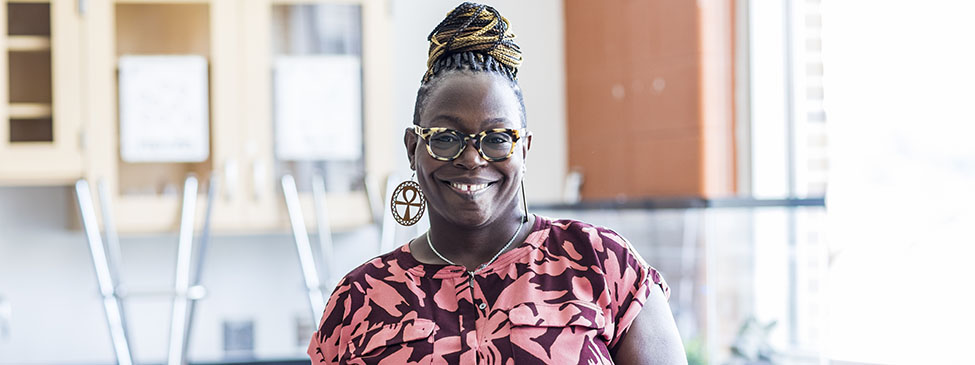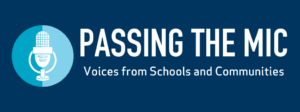What is a legacy? For some it’s planting seeds in a garden they’ll never see. For others, it’s a gift for their family. For Johari Toe, director of the Baltimore City Teaching Residency, it’s both, and it’s rooted in two words: acceptance and self-advocacy.
“I hope those who engage with me along my life’s journey see the importance of being able to look in the mirror and love the person that is staring back at them—being able to wholly accept that mistakes will happen, but the joy of the journey is forgiveness and moving forward and celebrating small wins every day,” she says. It’s a legacy goal not only inspired by the work she’s doing today, but also by the experiences she had back in the day.
A native of Baltimore City who matriculated through the Baltimore City Public School System, Johari and I have similar K-12 experiences. Though I’m from Atlanta, GA, we both grew up engulfed in Black brilliance, having just about all Black teachers in the classroom. It wasn’t an experience we realized was unique until we were older; but with 80% of teachers being white and 40% of all public schools not having a single teacher of color, it’s not one either of us takes for granted. Together, we talked about the impact Black teachers had on her, how she’s carrying their legacy forward and what she hopes for future generations.
How old were you when you first realized that having a Black teacher mattered?
It wasn’t until I started attending Morgan State University and learned about the varying experiences from my friends. When I decided to become an educator, I never thought about being in a school where there were no other Black educators. I genuinely believed it was the norm. So, when I learned there were kids who grew up with only a few Black teachers, or even worse, NO Black teachers in their classrooms, I not only realized how much representation matters, but also how much we need Black teachers and school leaders who are committed to children.
What impact did your teachers have on you and how are you carrying their legacy forward in your work today?
My most challenging teachers were all Black women who demanded that I represent myself and my mom (she spent a significant amount of time visiting me in school) with pride. They never let me just settle for the minimum and would constantly remind me of my potential whenever I attempted to stray. As I enter my 22nd year in education and have been thinking about how I am serving the very school district I grew up in as the director of the Baltimore City Teaching Residency, those Black women, along with my mom, and countless others make up the blueprint to the legacy I hope to leave. It is a true blessing to know that I am representing a program comprised of committed educators who are changing the face of education by developing and supporting the next generation of teachers.
Speaking of changing the face of education, what can schools and systems do to not only recruit, but also to retain Black teachers?
Be honest and address the deep seeded structures that directly and indirectly uninvite Black teachers to the classroom. Black teachers will stay and blossom in environments when they are seen as educators first and not babysitters or correctional officers. Black teachers will stay when they are developed as leaders and not task managers. Black teachers will stay when they are in environments that create intentional space for their voices to matter.
Preach! And as we recruit and retain those Black teachers, we can also change the outcomes of current and future generations of Black students. What hopes and dreams do you have for them?
Exactly. As the mother of a Black daughter, it has always been my hope, for my own child and every student, that they be educated without limits. Black students all deserve to understand the true history of the world and country they live in, how their existence in this world is not by mistake, and witness adults of all races unapologetically advocating for what they deserve.
To close us out, when I think about legacy and the legacy of the generations of Black people that came before us, one of the things I think about is their fight for justice. What does justice in education mean to you?
Justice is defined as “the quality of being fair and reasonable.” Therefore, justice in education should be that all students receive a fair and reasonable pre-K-12 education experience that offers the same resources, level of expectations, and wrap–around support for all children regardless of race, socioeconomic status, gender, ableness, or any other identities. Unfortunately, that is not the world that we live in, so there must be a reframing of what justice in education means. Our work is to constantly uplift, unearth, and call out policies and practices that intentionally close the pathways to the education that Black and brown children rightfully deserve. This cannot be accomplished and sustained by an individual. It takes a collective group that shares a commitment to reframing and reimagining the current structures that uphold systems that are steeped in oppressive practices.
For 20 years, Baltimore City Teaching Residency has partnered with Baltimore City Public Schools to recruit, train, and certify over 2,100 teachers. Learn more about the Baltimore City Teaching Residency and TNTP’s other Teaching Fellow Programs here.





